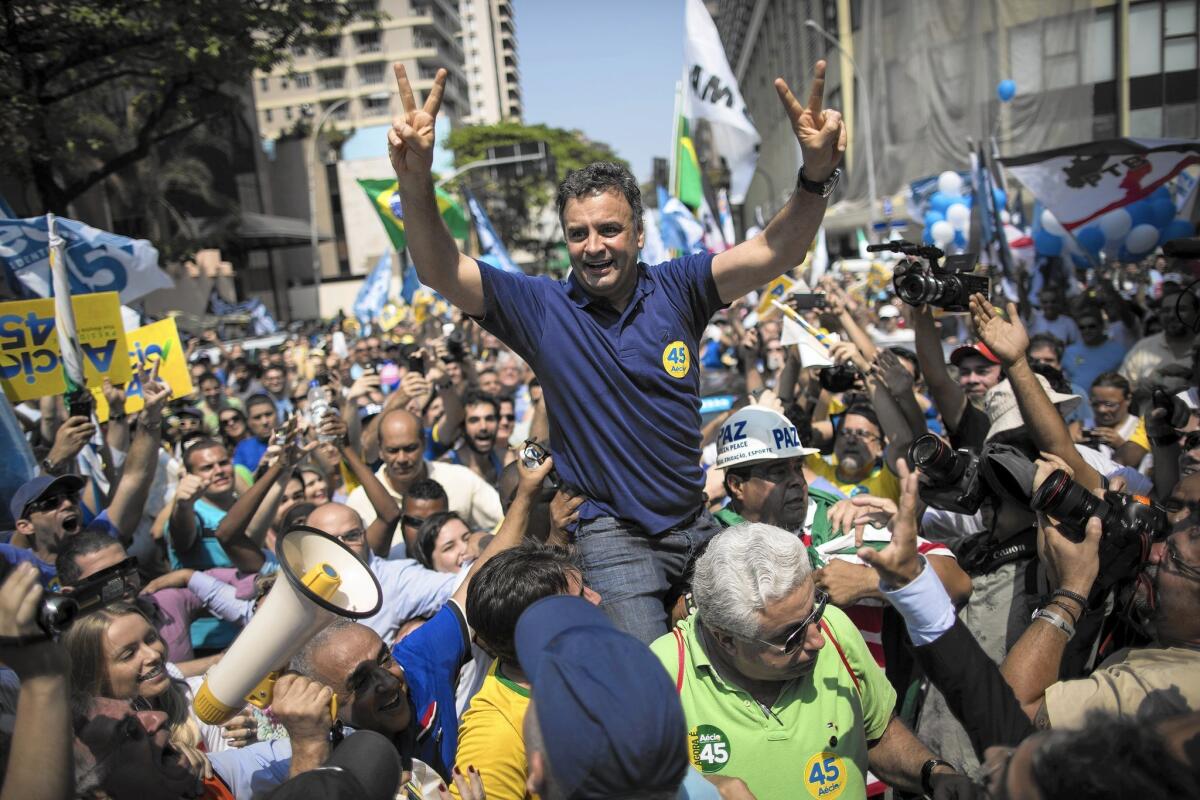Petrobras corruption case overshadows Brazil presidential campaign

Presidential challenger Aecio Neves took the podium at a yacht club in Copacabana this week for a rapid-fire news conference at which he took aim at incumbent Dilma Rousseff for a corruption scandal involving Petrobras, the state-owned oil company.
The president, he charged, had failed to respond to testimony by a former Petrobras director “that a chunk of money went to her party’s coffers.”
Soon after, Neves flew to Sao Paulo to take part in the latest in a series of debates with Rousseff, who proceeded to attack Neves’ Social Democracy Party for being implicated in the same scandal, which has been dogging Brazil’s largest company.
For good measure, she accused Neves personally of nepotism and corruption.
As the two candidates lurch neck-and-neck into a runoff election Sunday, corruption allegations are at the center of the free-swinging debate in South America’s largest country, as they have been in every presidential campaign since 2006. Analysts and insiders say rising election costs have ratcheted up the pressure on campaigns to raise money, creating an environment that is ripe for corruption.
The total cost of Brazil’s presidential, congressional and state elections in 2014 may exceed $3 billion, up from less than $2 billion in 2010 and just $321 million in 2002, according to government figures and a congressional report verified by academics.
Elections here are among the most expensive in the world, and loosely regulated campaigns are overwhelmingly paid for by corporations, in particular construction companies, food producers and banks.
Political and legal forces are pushing for spending limits or effective regulation, but face an uphill battle.
“Brazil didn’t reinvent the wheel in terms of the way campaign finance affects politics. But … campaigns are extremely expensive, due to the size of the country and the format of elections, and that increases the incentive for corruption,” said Joao Augusto de Castro Neves, a political analyst at Eurasia Group in Washington.
Candidates are given free TV time every night to air ads during the “political hour,” but they have to create the content to fill it. Social networks and websites are furiously updated. And candidates must crisscross a country that is nearly twice the size of the European Union and often difficult to traverse.
“It’s one of the most expensive places in the world to have an election, and costs have increased at a remarkable pace for the last 20 years,” said Mauro Macedo Campos, a professor of public policy specializing in political campaigns at Norte Fluminense University in Rio de Janeiro state.
Brazil’s campaign spending still pales compared with that of the United States, where the presidential and congressional elections in 2012 cost $6.3 billion, according to the Center for Responsive Politics. Brazil’s $3-billion figure includes state races, which aren’t included in the U.S. calculation.
Still, Brazil is a smaller and much poorer country, with a gross domestic product that is one-fifth that of the United States.
An investigation of alleged corruption at Petrobras is the largest and most recent to involve huge companies funneling money into political party coffers. The so-called mensalao vote-buying scandal in 2003, which threatened to bring down the government of Rousseff’s predecessor, Luiz Inacio Lula da Silva, involved advertising companies and is the only case that has led to major convictions.
The Petrobras case stems from the testimony of the company’s former executive Paulo Roberto Costa, now in jail in a corruption investigation. He agreed to talk in exchange for a plea deal, and Brazilian news media have been leaking details of his testimony in recent months. He reportedly said he was accepting bribes on inflated contracts in the company’s refinery division and passing along some of the money to Rousseff’s Workers’ Party and its allies.
However, he also reportedly said he bribed the leader of Neves’ Social Democratic Party. The investigation has not been concluded, but both candidates have used the reports to attack the other.
Across the country, accusations of campaign finance malfeasance are so common that they barely get attention unless they involve ruling parties.
Campos said major companies have continued to play an outsized role in the political process. “There are legal and moral ways they can do it, technically legal but obviously immoral ways … and illegal ways.”
Campaign finance reports for the presidential election were last updated Sept. 9, nearly a month before Neves and Rousseff advanced to the second round. Several of the largest donors to both campaigns have been implicated in news reports as playing roles in the Petrobras scandal, although all have denied breaking the law.
“Obviously the donating companies have interests in how the elected government runs things, which in my opinion is very unhealthy,” said Henrique Fontana, a lawmaker from the Workers’ Party who supports public campaign financing and cost limits.
The major candidates, including now-defeated environmentalist Marina Silva, support some kind of major political reform, although analysts think it unlikely that Congress will vote to undermine the machine that has given lawmakers power.
If the politicians remain deadlocked, Marcus Vinicius Furtado Coelho, president of Brazil’s Bar Assn., said there may be a legal case for imposing rules.
“The actual system is, in reality, a business investment strategy, in which large economic groups establish an extremely unhealthy relationship with democracy,” said Furtado, noting that more than 95% of the funding is supplied by companies, leading the Bar Assn. to file a motion in court to declare the system unconstitutional.
“The vote of the owner of a construction company should not be worth any more than his worker.”
Bevins is a special correspondent
More to Read
Sign up for Essential California
The most important California stories and recommendations in your inbox every morning.
You may occasionally receive promotional content from the Los Angeles Times.





